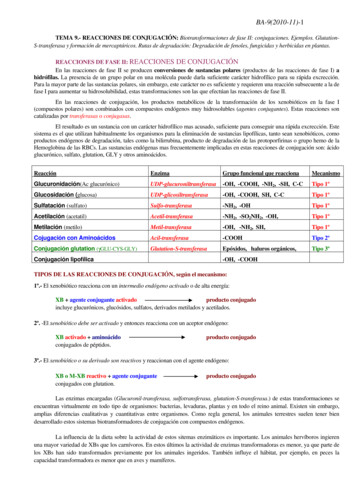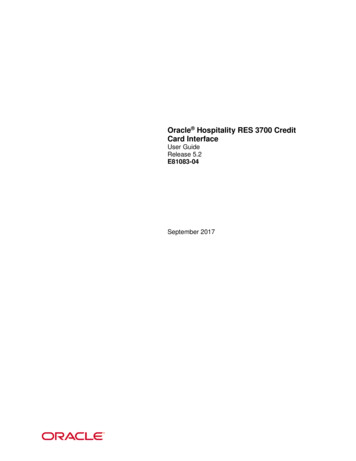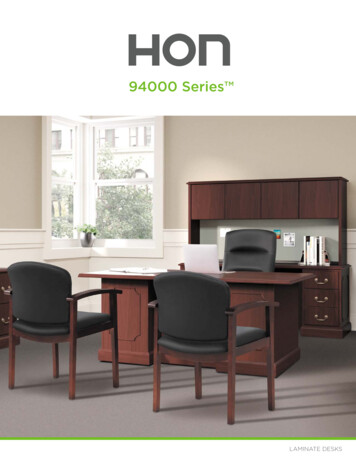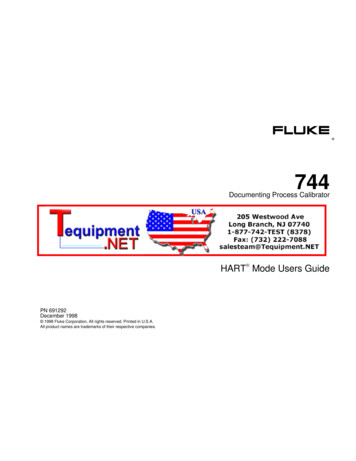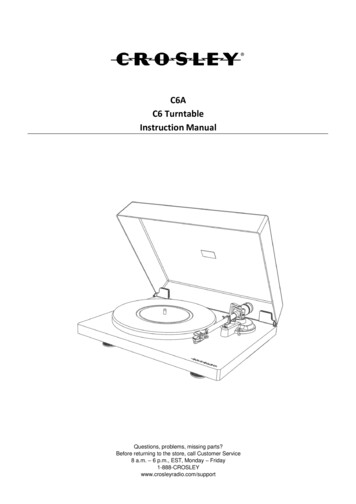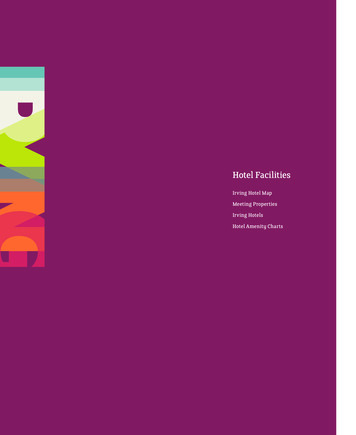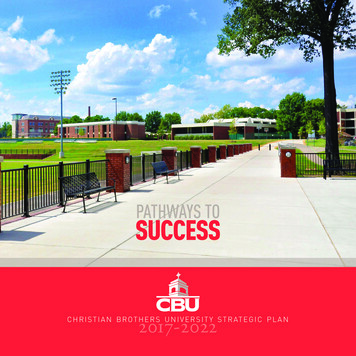
Transcription
c h r i s t i a n b r o t h e r s u n i v e r s i t y s t r at e g i c p l a n2017-2022
I am very pleased, as a member of the CBU community, to present to you the new ChristianBrothers University Strategic Plan. This plan was created by and for our community andhas been enthusiastically endorsed by the Board of Trustees. It is the result of many longmonths of information gathering, analysis, and careful, creative thought by members of theCBU faculty, staff, and administration across all disciplines and functions. Their hard workis deeply appreciated.As a Catholic and Lasallian university, CBU is part of a living, breathing mission. All of ourefforts are guided by the student-centered tradition of the De La Salle Christian Brothers,fostering academic excellence in a range of disciplines to prepare our students from allfaiths and backgrounds for careers and lives informed by the intrinsic values of faith,service, and community. In addition to our foundational commitment to our students — andto our rich family of faculty, staff, and alumni — CBU seeks to extend its mission to helptransform the larger educational landscape in Memphis and the Mid-South.The plan is consistent with our groundbreaking history and spirit, as well as our modernday reputation for innovation. Rather than rest on our already estimable record ofaccomplishment, CBU is committed to taking even greater responsibility for achievingmore together in the future.This strategic plan is intended to guide CBU through itssesquicentennial anniversary in 2021 and beyond. It addresses howwe, as a university, thrive within this living, breathing mission anduse our influence and innovative spirit to become a beacon and amentor for others and an instrument for preparing young men andwomen of all means and backgrounds for the project of building amore economically and socially just society.We’ve not gone into painstaking detail here — the plan is strategicinstead of tactical, laying out in four broad themes — People,Transformational Learning, Strategic Growth, and Institutional Story— where we plan to invest our resources and to what ends. We lookto you, the members of our community, to help us turn the plan intoaction by thinking critically and creatively about how you can alignyour time, talent, and efforts with the strategies outlined in thesepages.Dr. John Smarrelli Jr., PhDPresident, Christian Brothers University
Christian Brothers College was founded in 1871 by members of the Institute of the Brothers of Christian Schools,an international Roman Catholic religious teaching congregation. The Brothers came to Memphis at the request ofthe Memphis clergy, after more than a decade of previously unsuccessful efforts to persuade them to open a collegein Memphis. It opened its doors at 612 Adams on November 19, 1871 with four Christian Brothers and 87 students,functioning as a combined elementary school, high school, and college.The initial decades in Memphis were a period of struggle — recovery from the Civil War and Reconstruction wastedious, and three epidemics of yellow fever in the 1870s took their toll. Despite CBC’s growth in the early yearsof the 20th century, World War I caused it to award its last college degrees for severaldecades.Elementary classes were dropped in 1922, and the institution operated as a high school only for the next 18 years.During the 1920s and 1930s, the high school grew and enrollment outgrew the Adams Street facility. In 1939, theBrothers laid the cornerstone of a three-story building on new property and reopened the next year at a new campuson East Parkway South.The school re-opened a junior college department and granted Associate of Arts degrees in 1942. The next year,however, with World War II raging, saw a dramatic decline in junior college enrollment and it was forced to closeagain temporarily. It reopened in 1947 with 70 students enrolled, half of them war veterans attending under thenew G.I. Bill. In 1953, the decision was made to expand the junior college into a four-year institution to moreadequately serve the needs of the community. The new curriculum began with degrees in Business Administrationand Electrical Engineering, with the first bachelor’s degrees in 40 years being awardedin 1955.In 1961, a plot of land on Walnut Grove Road was purchased, and Christian Brothers High School opened its separatedoors in 1965. Since the college took sole possession of the East Parkway campus, many changes have occurred.In 1970, women were accepted as students for the first time. Today, the student population of CBU is 51% female.An accelerated Evening Program was added in 1978 to meet the needs of adult students; today’s College of AdultProfessional Studies is a separate branch of the university. Programs at the graduate level were reinstated in 1987,and Christian Brothers College officially became Christian Brothers University in June 1990. Today, CBU offersmaster’s degrees in Accounting (MAcc), Business Administration (MBA, HMBA), Catholic Studies (MACS), Education(MEd, MAT, MSEL), Engineering (MSEM, MSCIS), and Physician Assistant Studies (MSPAS).CBU has grown to a student population of more than 1,800 and exponentially expanded its degree offerings. Today,CBU offers bachelor’s degrees in more than 60 academic majors and concentrationsin the arts, business, engineering, and sciences. More than 20 buildings have beenadded to the campus in the last 77 years, most recently the Cooper-Wilson Center for Life Sciences (2008), theLiving Learning Center (2011), and the Rosa Deal School of Arts (2016). CBU will also open a satellite location inCrosstown Concourse in August of this year.CBU embarked on an agreement with Shelby County Schools to form a lab school in the former Fairview MiddleSchool, and the resulting Maxine Smith STEAM Academy opened in 2014. CBU also collaborates with Middle CollegeHigh School in the same building, and is an active partner in Crosstown High School, which will open in the fall of2018 at Crosstown Concourse.
STAKEHOLDERTo be a growing, energized, andinnovative Catholic University,ever striving to provide thehighest quality experiences for theacademic and ethical developmentof the whole ANSFORMATIONAL LEARNINGSTRATEGIC GROWTH & VITALITYINSTITUTIONAL STORYORGANIZATIONALCAPACITY
FACULTY & STAFFENGAGEMENTINCREASEHIGH ECOMPENSATION& BENEFITSINVEST INSTUDENT SUCCESSPROGRAMS ANDIMPROVERETENTIONINCREASE TUITIONREVENUE ANDEXTERNAL FUNDINGCAPITALCAMPAIGNSUCCESSASSESS ANDSUPPORTUNIVERSITYSERVICESCREATE ACULTURE OFASSESSMENTINCREASEINSTITUTIONALAGILITY FORMARKET CHANGEMULTIPLY &LIFYCOMMUNICATIONAND STORYTELLINGCHANNELSRECRUIT &RETAINTALENTEDINDIVIDUALSEXPAND VIBRANTACADEMICPROGRAMS ANDSTUDENTEXPERIENCESMAXIMIZESPACE ANDFACILITIES FORGROWTHEMBED ALASALLIANEXPERIENCE
CBU will recruit and retain facultyand staff who continue to developand improve in their areas ofexpertise. They will be competitivelycompensated and evaluated foreffectiveness. As a satisfied,motivated, and energized workforce,they will foster a welcoming andengaging campus environment.
18 MONTH GOALSDevelop Benchmark for Faculty & Staff Compensation Goal Associate & Professor: FY 2019 80% of target funded(FY 2022 100% funded) Assistant & Instructor: FY 2019 Greater of 80% target or 100% minimum(FY 2022 100% funded) Staff targets: FY 2019 100% fundedGreat Places to Work: Increase “Warrants Attention” Scores to “Fair” Policies, resources, and efficiency: 52% Base / 55% Goal Shared governance: 51% Base / 55% Goal Senior leadership: 47% Base / 55% Goal Faculty, administration, and staff relations: 52% Base / 55% Goal
INTERNAL PROCESSESASSESS & SUPPORTUNIVERSITY SERVICESInitiative #1: Fall 2018Implement a one-stop-shop for Admissionsand student business services, includingRegistrar, Financial Aid, and Business Office.Initiative #2: Spring 2018Design an onboarding program for newemployees reflecting CBU culture, values,and Lasallian mission.ORGANIZATIONAL CAPACITYRECRUIT & RETAINTALENTED INDIVIDUALSInitiative #1: Spring 2018All employees will have engaged in at leastone professional development activity. Employees engaged in professionaldevelopment- 70% Base / 85% Goal
All CBU students will have morehigh-impact, transformationallearning experiences that fosterpersonal growth and set them apartin graduate school and the jobmarket. To achieve this, CBU willoptimize our current learning spaces,and we will develop and expand ourprograms to meet student needs.The value and impact of all learningexperiences, both in and out of theclassroom, will be continuouslyassessed and improved.
18 MONTH GOALSRETENTION FY 2018: Freshman to Sophomore 82.8% (FY 2022: 85%) FY 2018: Freshman to Junior 66.6%(FY 2022: 70%)
INTERNAL PROCESSESCREATE A CULTUREOF ASSESSMENTInitiative #1: Spring 2018All degree programs will have documentedand measurable learning objectives.Initiative #2: Spring 2018All program directors will be trained and fullyutilizing assessment processes and/or software.ORGANIZATIONAL CAPACITYEXPAND VIBRANTACADEMIC PROGRAMS& STUDENT EXPERIENCESInitiative #1: Fall 2018Implement a pedagogical framework to beutilized across all programs.Initiative #2: Fall 2018Revise and implement a First Year Experienceprogram focused on leadership, personalgrowth, and interpersonal skills, utilizingindividualized strength assessment.
CBU will grow its number of students and significantlyimprove retention rates. CBU will optimize facilities andother support services necessary for success.
18 MONTH GOALSHEADCOUNT/ENROLLMENT Fall 2018: 1,211 Undergraduates Fall 2018: 339 Undergraduate Freshmen FY 2018: 233 CAPS Undergraduates FY 2018: 24 PA Students (FY 2022: 116)
INTERNAL PROCESSESINCREASE INSTITUTIONAL AGILITYFOR MARKET CHANGEInitiative #1: Fall 2018Complete program prioritization review to establish enrollment minimums/targets for all programs.Initiative #2: Spring 2018Launch enrollment campaign for nursing and two graduate programs.Initiative #3: Fall 2017Launch an international support and retention program for incominginternational students, ESL, and others.
ORGANIZATIONAL CAPACITYMAXIMIZE SPACE & FACILITIES FOR GROWTHInitiative #1: Fall 2017Secure 10 million lead gift for the student center project.Initiative #2: Fall 2017Complete a residential master plan. FY 2018 Freshman occupancy of 50% (FY 2022: 80%) FY 2018: Residential occupancy of 95%Initiative #3Build and renovate facilities to enhance student life and learning. FY 2021/22: Completed renovation of Plough Library, Thomas Center, and St.Joseph Hall
CBU will articulate and cultivate adistinctive narrative of our Catholic andLasallian institutional identity. Thisnarrative will permeate the academic,social, and spiritual experiences of ourstudents, faculty, staff, and alumni,and will constitute the foundationof the image of the University to oursurrounding communities. Members ofthe CBU community will embody theLasallian charism through engagedlearning, personal and spiritual growth,and through investments of their time,talent, and treasure in the future ofthe institution. All members of theCBU community will be able to tell aclear, consistent, andcomprehensivestory of ourUniversity.
18 MONTH GOALS Increase student volunteer hours: Base 1,800 / Goal 1,950 Increase campus giving: Faculty Base 20% / Goal 40%Staff Base 35% / Goal 60%Student Base 4% / Goal 10%Alumni Base 8% / Goal 19%
INTERNAL PROCESSESMULTIPLY & AMPLIFYCOMMUNICATION &STORYTELLING CHANNELSInitiative #1: Spring 2018Evaluate mission statement to insureconsistency of current and anticipatedprograms with Lasallian tradition.Initiative #2: Spring 2018Complete Strategic Marketing Plan thatsupports the Strategic Plan and institutionalprogress.
ORGANIZATIONAL CAPACITYEMBED LASALLIAN EXPERIENCEInitiative #1: Spring 2018Create a Center for Community Engagement at CBU to coordinate,publicize, and track engagement efforts with and for students,alumni, faculty, and staff.Initiative #2: Fall 2017Complete a strategic plan for Campus Ministry.
MR. MARK BILLINGSLEYVice President for AdvancementMS. DEBORAH BLANCHARDVice President for Communications & MarketingDR. TRACIE BURKEProfessor of Behavioral Sciences / Director ofHonors ProgramMS. KAY CUNNINGHAMDirector of Plough LibraryMR. BRETT DOTYAssociate Vice President for InformationTechnology/CIOBROTHER DOMINIC EHRMANTRAUTSpecial Assistant to PresidentDR. JACK HARGETTAssociate Vice President for Academics &Strategic Initiatives (Data Steward)DR. PAUL HAUGHTVice President for Academics & Student Life (Co-Chair)MS. CAROLYN HEADExecutive Vice President for Administration& Finance /CFODR. ANNE KENWORTHYVice President for Enrollment ManagementDR. JOHN SMARRELLI JR.PresidentMR. BRIAN SUMMERSDirector of AthleticsCHRISTIAN BROTHERS UNIVERSITYSTRATEGIC PLAN 2017-2022DR. ANTHONY TRIMBOLIAssociate Professor of ChemistryDR. JAMES BUCHANAN WALLACEAssociate Professor of Religion & Philosophy(Co-Chair)
MS. MELISSA ANDREWSDirector of Institutional Research & EffectivenessDR. PASCAL BEDROSSIANProfessor of Mathematics & Computer ScienceMS. DEBORAH BLANCHARDVice President for Communications & MarketingDR. TIMOTHY DOYLEAssociate Vice President for Student LifeMR. GREG ELLERDirector of Human ResourcesMS. JULIA KUETERLasallian Scholar, Campus MinistryDR. JOHN LEWISDirector of Financial AidMR. CORY MAJORDean of Academic Services & Faculty DevelopmentMS. MONÁ MCAFEEDirector of Accounts Receivable, Business OfficeMS. JORDAN SCARLESKISenior Director of Development, Office ofAdvancementBROTHER TOM SULLIVANDirector of Campus MinistryCHRISTIAN BROTHERS UNIVERSITYSTRATEGIC PLAN 2017-2018
CHRISTIAN BROTHERS UNIVERSITY650 EAST PARKWAY SOUTH MEMPHIS, TENNESSEE 38104(901) 321-3000 www.cbu.edu
An accelerated Evening Program was added in 1978 to meet the needs of adult students; today’s College of Adult Professional Studies is a separate branch of the university. Programs at the graduate level were reinstated in 1987, and Christian Brothers College officially became Christian Brothers University



